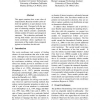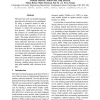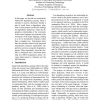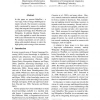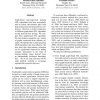ACL
2010
13 years 10 months ago
2010
The adoption of Machine Translation technology for commercial applications is hampered by the lack of trust associated with machine-translated output. In this paper, we describe T...
ACL
2010
13 years 10 months ago
2010
This paper examines how a new class of nonparametric Bayesian models can be effectively applied to an open-domain event coreference task. Designed with the purpose of clustering c...
ACL
2010
13 years 10 months ago
2010
Most previous work on trainable language generation has focused on two paradigms: (a) using a statistical model to rank a set of generated utterances, or (b) using statistics to i...
ACL
2010
13 years 10 months ago
2010
We investigate active learning methods for Japanese dependency parsing. We propose active learning methods of using partial dependency relations in a given sentence for parsing an...
ACL
2010
13 years 10 months ago
2010
In this paper we describe an intuitionistic method for dependency parsing, where a classifier is used to determine whether a pair of words forms a dependency edge. And we also pro...
ACL
2010
13 years 10 months ago
2010
ACL
2010
13 years 10 months ago
2010
We present a method for automatically generating focused and accurate topicspecific subjectivity lexicons from a general purpose polarity lexicon that allow users to pin-point sub...
ACL
2010
13 years 10 months ago
2010
Graph-based semi-supervised learning (SSL) algorithms have been successfully used to extract class-instance pairs from large unstructured and structured text collections. However,...
ACL
2010
13 years 10 months ago
2010
Word Sense Disambiguation remains one of the most complex problems facing computational linguists to date. In this paper we present a system that combines evidence from a monoling...
ACL
2010
13 years 10 months ago
2010
In this paper, we propose a novel approach to automatic generation of summary templates from given collections of summary articles. This kind of summary templates can be useful in...

